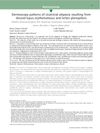Isolated Body Hair Loss: An Unusual Presentation of Lichen Planopilaris
January 2016
in “
Skin appendage disorders
”

TLDR A man with rare Lichen Planopilaris lost body hair, not scalp hair, and treatment stopped itching but didn't regrow hair.
The document reports an unusual case of Lichen Planopilaris (LPP), a rare inflammatory disorder that typically affects the scalp, presenting as isolated body hair loss in a 38-year-old male. The patient experienced progressive hair loss on his limbs over two years, with intense itching preceding the alopecia. Previous treatments with antifungal agents were ineffective. Dermoscopic examination revealed perifollicular erythema and scaling, and a biopsy confirmed the diagnosis of LPP. The patient's symptoms of pruritus resolved after treatment with doxycycline and topical clobetasol, but hair regrowth was not observed. The patient chose not to continue treatment but was scheduled for follow-up every three months. This case highlights the need for clinical suspicion of LPP in patients with body hair loss, as the diagnosis can be challenging due to its rarity and the delay in proper diagnosis.










